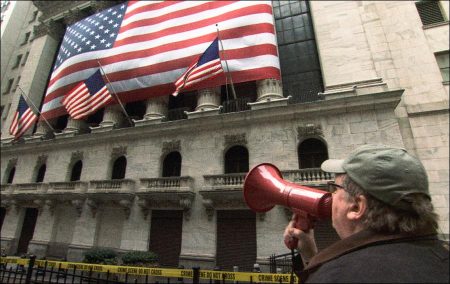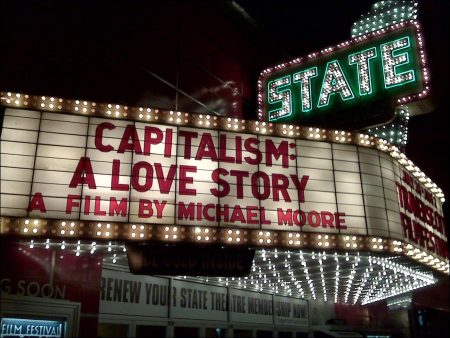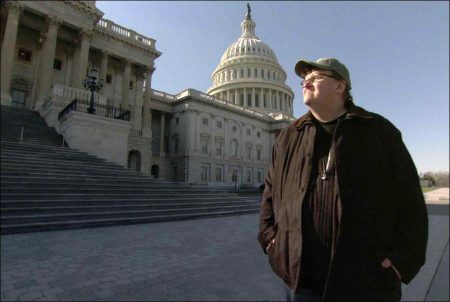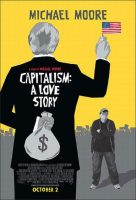Taglines: The rules are simple. You break them, you die…
On the 20-year anniversary of his groundbreaking masterpiece Roger & Me, Michael Moore’s Capitalism: A Love Story returns to the issue he’s been examining throughout his career: the disastrous impact of corporate dominance on the everyday lives of Americans (and by default, the rest of the world). But this time the culprit is much bigger than General Motors, and the crime scene far wider than Flint, Michigan. From Middle America, to the halls of power in Washington, to the global financial epicenter in Manhattan, Michael Moore will once again take filmgoers into uncharted territory.
With both humor and outrage, Michael Moore’s Capitalism: A Love Story explores a taboo question: What is the price that America pays for its love of capitalism? Years ago, that love seemed so innocent. Today, however, the American dream is looking more like a nightmare as families pay the price with their jobs, their homes and their savings. Moore takes us into the homes of ordinary people whose lives have been turned upside down; and he goes looking for explanations in Washington, DC and elsewhere. What he finds are the all-too-familiar symptoms of a love affair gone astray: lies, abuse, betrayal…and 14,000 jobs being lost every day.
Capitalism: A Love Story is both a culmination of Moore’s previous works and a look into what a more hopeful future could look like. It is Michael Moore’s ultimate quest to answer the question he’s posed throughout his illustrious filmmaking career: Who are we and why do we behave the way that we do?
On the 20-year anniversary of his groundbreaking masterpiece Roger & Me, Michael Moore’s Capitalism: A Love Story returns to the issue he’s been examining throughout his career: the disastrous impact of corporate dominance on the everyday lives of Americans (and by default, the rest of the world). But this time the culprit is much bigger than General Motors, and the crime scene far wider than Flint, Michigan. From Middle America, to the halls of power in Washington, to the global financial epicenter in Manhattan, Michael Moore will once again take filmgoers into uncharted territory.
With both humor and outrage, Michael Moore’s Capitalism: A Love Story explores a taboo question: What is the price that America pays for its love of capitalism? Years ago, that love seemed so innocent. Today, however, the American dream is looking more like a nightmare as families pay the price with their jobs, their homes and their savings. Moore takes us into the homes of ordinary people whose lives have been turned upside down; and he goes looking for explanations in Washington, DC and elsewhere. What he finds are the all-too-familiar symptoms of a love affair gone astray: lies, abuse, betrayal…and 14,000 jobs being lost every day.
Capitalism: A Love Story is both a culmination of Moore’s previous works and a look into what a more hopeful future could look like. It is Michael Moore’s ultimate quest to answer the question he’s posed throughout his illustrious filmmaking career: Who are we and why do we behave the way that we do?
Questions for Michael Moore
1. What inspired you to make this movie? Why now?
In America, people tend to wait for the coast to be clear before openly discussing certain topics and saying certain things. Even if it’s right in front of our noses and people sense that something’s gone terribly wrong—they go with the flow. They adjust and accept mediocrity, get comfortable and settle in. Most feel that if they just keep their heads down and their noses to the grindstone, they’ll squeak by. But someone has to speak up.
My goal is to address the questions that have been forming in my head for some time and that I believe our society needs to address as well. It’s not the job of the artist or the musician or the filmmaker to follow the crowd. Politicians won’t change anything on their own. It doesn’t make any sense for them to be courageous; that’s too risky. It’s the people that need to make them change. Then, once the truth emerges, those who scoffed and sneered will turn around and sound an awful lot like the lonely people they once ridiculed.
2. How long did the film take to complete?
We began production in the spring of 2008. But in reality, this is the movie I’ve been making for the past twenty years. Since Roger & Me debuted in 1989, there have been common threads and ideas present in all of my projects. Capitalism: A Love Story is not just a continuation of that, it’s the culmination.
3. A lot of people are angry about the recent financial meltdown and its effects on investments, jobs, home prices and government budgets, but they don’t necessarily know who to blame. Will this film help us to see who was at fault for this collapse?
I don’t think it’s really a mystery who’s behind this financial collapse. There’s been a lot of anger directed at the banks and financial institutions that hijacked our economy and gambled it away. And at the politicians who allowed it to happen… Don’t get me started.
This film is not about a boom or a bust or a bailout. I started working on this before the economy tanked and before I had any idea there would be a massive looting of the U.S. Treasury a month before a Presidential election. I don’t focus on one individual, or company or issue; this is the big enchilada. This film takes on the system that allows, encourages and, most importantly, guarantees this corruption.
4. In terms of the government’s role, it seems like there’s plenty of blame to go around. Members of both political parties have contributed to the current situation. Are anybody’s hands clean in Washington?
There isn’t enough Purell hand sanitizer* in the world to disinfect Washington. This film names names, and goes after both parties without fear or favor. Every political discussion degrades into liberal against conservative and Democrat against Republican. That’s just a distraction from the real issue: the system we operate under owns both parties and both liberals and conservatives. There are some loud and bitter arguments between the two parties, but they are all looking to stay in power and the last thing they want to do is rock the boat. This film will address the issues that are not being debated in Congress or on the Sunday morning talk shows (which are brought to you by Boeing, AT&T, Archer Daniels Midland, ExxonMobil…).
*This is not an endorsement for Purell. I’m sure the pharmacy-brand hand sanitizers work just as well and are a little bit cheaper.
5. What do you hope audiences will take away from this film?
Popcorn and pitchforks.
Capitalism A Love Story (2009)
Directed by: Michael Moore
Starring: Michael Moore
Screenplay by: Michael Moore
Cinematography by: Daniel Marracino, Jayme Ray
Film Editing by: Jessica Brunetto, Alex Meillier, Tanya Meillier
Music by: Jeff Gibbs
MPAA Rating: R for some language.
Distributed by: Overture Films
Release Date: October 2, 2009
Visits: 85






